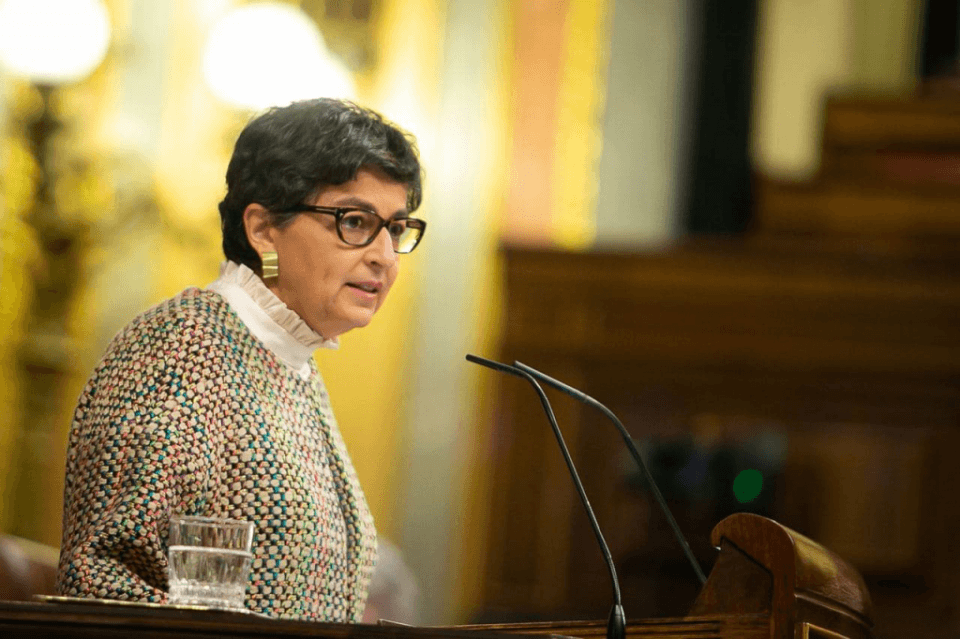Latest update to this report: Spain changes Covid-19 test requirements for travellers
Also read: Coronavirus in Spain figures (28 Dec)
Spain’s Foreign Minister, Arantxa González Laya, has acknowledged that ‘there may be adjustments’ in the obligation to show a negative result from a PCR test in order to enter Spain from a high-risk country – although the ‘adjustments’ might be minor.
Speaking in Brussels on Monday, González Laya said she was ‘aware’ of the many complaints received from different sectors and that her team was ‘examining’ some of the issues. Complaints have included the language in which the results of the test must be shown (Spanish or English), as well as the minimum age of which travellers must comply with the requirement. There have also been complaints from Spanish nationals who are planning to return home for Christmas, and from those who travel for work reasons for just 24 hours – and have to take the test in Spain to return to Spain hours later, although the results take time to receive.
Since 23 November, Spain has introduced the obligation to show a negative PCR test, taken within 72 hours of arrival from a high-risk country, in order to enter Spain. Travellers could face fines of up to €6,000 for failing to provide the details.The full rules state that all passengers are required to do so, ‘regardless of their nationality, age or any other consideration’.

In response to questions whether antigen tests instead of PCR tests could also be accepted, González Laya simply said ‘when they are sufficiently reliable’.
Regarding recommendations from the European Commission last week, which stated that quarantine or PCR tests should not be necessary between European regions with a similar incidence rate of Coronavirus, González Laya referred to what was approved by EU leaders at the October European Council meeting. ‘At the last European Council [meeting], they chose to replace quarantines with PCR,’ she said. ‘And when it is estimated that they can be abolished, then we will do so.’
Last week, the European Centre for Disease Prevention and Control (ECDC) and the European Aviation Safety Agency (EASA) also warned that asking for a negative test could be a dangerous policy. Airlines have also expressed their concern over the rule, urging that an antigen test be required instead.
‘The PCR tests are not a mechanism that the Spanish government has made up to pester people; a number of EU member states have also launched it,’ said González Laya.
ALSO READ: Fines up to €6,000 for travellers to Spain arriving without negative PCR test
The Spanish government has now published the latest update of countries from which a negative PCR test is needed in order to enter Spain by air or sea, and it now also covers the Christmas arrivals period.
The list, in force from 14-27 December, only contains slight changes compared to the previous one, in operation until 13 December. Here’s the latest list of countries (working for both 30 November to 13 December and 14 December to 27 December):
EU-EEA countries: Austria, Belgium, Bulgaria, Croatia, Cyprus, Czech Republic, Denmark (except for Faroe Islands and Greenland – also except for Nordjylland from 14-27 December), Estonia, Finland (from 14 December, except for regions of Etela-Suomi, Lansi-Suomi, Pohjois-Ja Ita-Suomi and Aland), France (except for Guadalupe from 14-27 December), Germany, Greece (except for region Notio Aigoa until 13 December), Hungary, Italy, Latvia, Liechtenstein, Lithuania, Luxembourg, Malta, Norway (except for regions of Agder, Innlandet, Møre og Romsdal, Nordland, Rogaland, Troms og Finnmark, Trøndelag and Vestfold og Telemark – also except for Vestland from 14-27 December), Poland, Portugal, Romania, Slovakia, Slovenia, Sweden and The Netherlands.
Countries outside EU-EEA: Albania, Andorra, Argentina, Armenia, Aruba (from 14 December), Azerbaidjan, Belize, Belarus, Bosnia and Herzegovina, Brazil, Canada, Cape Verde, Colombia, Costa Rica, Curaçao, French Polynesia (France), Georgia, Gibraltar (UK), Guam, Iran, Jersey (from 14 December), Jordan, Kuwait (until 13 December), Lebanon, Moldova, Monaco (until 13 December), Montenegro, Morocco, North Macedonia, Palestine, Panama, Puerto Rico, Russia, Saint Martin (the Netherlands), San Marino, Serbia, Switzerland, Ukraine, United Arab Emirates, UK, USA.
For further details, also visit: www.spth.gob.es
ALSO READ: Restrictions in Spain for Christmas and New Year period
ALSO READ: Details of curfews & restrictions for all regions of Spain during ‘State of Alarm’
ALSO READ: Catalonia’s four phase plan to lift Covid-19 restrictions – full details
ALSO READ: Fines up to €6,000 for travellers to Spain arriving without negative PCR test
ALSO READ: New ‘State of Alarm’ in Spain
Click here for all previous reports on: Coronavirus in Spain
Sign up for the FREE Weekly Newsletter from Spain in English
Please support Spain in English with a donation.
Click here to get your business activity or services listed on our DIRECTORY


